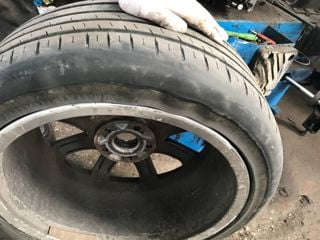The Government will not introduce a licensing regime similar to that faced by HGV fleets to raise standards for van operators, according to Driver and Vehicle Standards Agency (DVSA).
The agency has been tasked with cracking down on businesses using LCVs which do not meet existing regulations.
Despite finding a high proportion of offenders, it says the Government will not change the law.
Paul Walker, trade and industry engagement manager at DVSA, said: “The legislation won’t change. There is no appetite from Government to bring in any fresh legislation; it is trying to make it work within the existing framework.”
The Vehicle and Operator Services Agency (VOSA), which was replaced by the DVSA in April, announced a drive to improve standards within the van industry last year (fleetnews.co.uk, July 17, 2013).
The organisation, which had traditionally focused on HGVs, increased its roadside inspections and other enforcement activity to target issues such as vehicle roadworthiness, overloaded vans and towing infringements.
It told Fleet News it would try to educate operators in the first instance, but would issue fines of up to £200 per offence to drivers if required.
Ian Walker, who is also a trade and industry engagement manager at DVSA, said: “The reason we were focusing on van compliance was that there were a lot of complaints. After initially embarking on a trial, our findings were quite shocking.”
LCVs are involved in twice as many accidents as HGVs and have an MOT first-time failure rate of 50%, compared to 33% for cars.
Furthermore, in DVSA checks, LCVs are on average prohibited six out of 10 times while vehicles are overweight three-quarters of the time.
Walker told delegates at a recent Brake seminar on vehicle safety: “We’re only looking for the minimum levels of roadworthiness.
“However, there are a lot of people that don’t make the minimum standard and that’s what we’re there to deal with, while leaving those who are compliant to carry on with their business.
“We’ve just got to focus on the really poor operators and there is a hell of a lot of them.”
The top five prohibitions issued to vans this year, according to DVSA’s effectiveness report, were for windscreen and wipers, tyres, engine and exhaust, road wheels and hubs, and transmission.
It also says that 85% of the defects it finds at the roadside should have been picked up by the driver when conducting a walk-round check or when driving the vehicle.
DVSA’s hard-line approach has been supported by Freight Transport Association (FTA), which set up the Van Excellence scheme to raise standards in the industry.
It operates a code of conduct that encourages van operators to adhere to rules and regulations and gives them advice on how to run their fleet safely and legally.
It is also spearheading a driver passport scheme, which could help raise standards and put van drivers on a more professional footing (Fleet News, May 1).
The passport would include an agreed minimum level of driver training – proof that the driver is competent behind the wheel – and reduce the need for retraining when fleets take on new employees from other businesses. It would also create a formal qualification, which the fleet could then choose to top-up with training, with its own customer service standards, for example.
Now the possibility of any new legislation targeting van operators is beginning to fade, the FTA schemes, along with roadside checks by the DVSA, look set to be the main drivers to improving van safety.
Mark Cartwright, head of LCVs at FTA, said: “The difference between good and bad operators is that the good ones think of their LCVs as small lorries and maintain them as such. The bad ones think of them as funny shaped cars and need to be re-educated.”






















Edward Handley - 21/07/2014 11:38
Any change in the law would probably have to come from Europe. Germany proposed a while back that the LGV licence limit should be lowered from 3500 to 2800 kg, and that vans over 2800 kg should be fitted with tachographs but there was little enthusiasm for the idea and lots of strong opposition. The reason for the increasing popularity of vans is simply that they are not subject to the raft of legislation applied to large vehicles - vocational licences, drivers hours & tachos, O licences, etc., which makes them cheaper and a lot less hassle to operate and in these hard economic times, the Government, and the public like cheap a lot. The fact is though that existing legislation is perfectly adequate to ensure that van fleets are operated safely - it is already illegal to overload, they are covered by British Domestic drivers hours rules (although without any need to keep records) and the Working Time Directive and the driver and employer can be prosecuted if defective vehicles are used on the road. So why is there a problem? The problem is simply that there is little or no enforcement, so van fleet operators get away with running defective and overloaded vehicles and making their drivers work ridiculous hours, which results in crashes. If the crash involves a fatality the driver gets hung out to dry and the operator sometimes gets a substantial fine, but if its just vehicle and load damage the insurer pays out and the Authorities seldom can be bothered to act. The Police view is that they have other priorities - because the public, and the Police Commissioners, are much more concerned about other issues because no one has ever got elected to Parliament, or as a Police Commissioner, on a road safety ticket! If the kind of Police time and money invested in Operation Yewtree chasing historical child abuse cases had been invested in road policing and making van operators behave the situation would be very different. I am certainly not saying that money should be diverted from chasing down and prosecuting child abusers, but it would be nice if the same level or resources, and mainstream press interest, applied to saving life and limb on our roads.